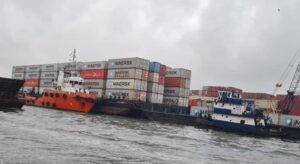2022: Nigerian Importers To Spend Over N500bn On Container Deposits

By Kenneth Jukpor
Complexities and inefficiencies in Nigeria’s port sector have been projected to cost the nation over N500biillion in 2022 as importers and freight agents are expected lose demurrage on container deposits for a minimum of 10 days on over 1.6million containers.
Shipping experts made this projection at a breakfast meeting organized by the Nigerian Chamber of Shipping (NCS) today, themed: “Nigerian Economic Outlook 2022: Special Focus on Maritime/ Shipping Industry”.
While speaking at the virtual meeting, a Commercial Shipping expert and Managing Director of Aviva Quartet Limited, Mr. James Olley argued that the nation’s losses to container deposit would exceed $1.2million (N500,400,000 using the Central Bank of Nigeria, CBN, official exchange rate of N417/$).
Olley made this calculation using an average of 10days container deposits lost on empty containers, however, most experts assert that it takes a minimum of 15days to return empty containers after the initial free period of 3-5days.
His calculation were premised on an earlier postulation of an independent maritime professional and former Director General of the Nigerian Maritime Administration and Safety Agency (NIMASA), Dr. Temisan Omatseye who stated that Nigeria’s cargo throughput should be around 1,626,606 twenty-four equivalent units (TEUs) in 2022.
According to Omatseye, taking into consideration a year-on-year increase of 3 percent, container throughput for 2022 should be around 1,621,606TEUs.
Meanwhile, MMS Plus calculations going by N25,000 per day puts the anticipated fiscal losses at approximately N405billion for 1,621,606 TEUs expected at Nigerian seaports.
This colossal sum is also seperate from the storage charges collected by seaport terminals and other fees levied at the ports by various government agencies and extortion witnessed on the port access roads.
However, there are optimisms that the completion of the port access roads, improvement in barge operations for cargo evacuation via waterways as well as railway alternatives; an increase in container traffic would lead to more activities for bonded terminals and inland dry ports.
Also speaking at the conference, Dr. Olisa Agbakoba, SAN, observed that the contribution of the nation’s maritime sector is only captured by the National Bureau of Statistics (NBS), but it’s missing in the other policy frameworks and economic development plans of the country.
To address this challenge he termed ‘Policy Disconnect’, Agbakoba called for a robust industry stakeholders engagement with the policy actors; especially the legislators, relevant Ministers and the presidency.
While concurring with Agbakoba’s suggestion, the moderator of the discourse, Dr. Emeka Akabogu added that the approach could reposition the sector to realize its N7trillion potential and lead to the attainment of the 4 million jobs projected by the Nigerian Economic Summit Group (NESG) in the sector.
On his part, Dr. Chris Asoluka stressed that a more concise focus is needed to enable Nigeria prioritize specific aspects of shipping as Philippines are known for seafarers development, South Korea and USA for ship building, Netherlands and Belgium for port development, among others.
In his opening speech, the President of NCS, Mr. Andy Isichei assured that the Chamber would continue to provide a unique platform for quality engagements in a bid to address the multilateral industry challenges.
Isichei, who was represented by the Chairperson of the NCS Executive Board, Ify Akerele expressed optimism that the maritime bigwigs which attended the event as speakers and panelists would deliver top-notch deliberations.







